Many people believe hosting with Airbnb is an easy way to earn money and enjoy a comfortable lifestyle. As a result, the vacation rental industry has seen an influx of new hosts.
However, running a short-term rental can be quite challenging. It requires time, effort, and a strong business mindset. Therefore, if you’re new to Airbnb, learning how to get started and mastering essential hosting skills is crucial.
In this blog, we’ll answer all your questions on how to set up an Airbnb. We aim to help you stand out in the highly competitive market with over 8 million listings worldwide.
What Should You Know Before Hosting with Airbnb?
Before officially becoming an Airbnb host, it’s recommended to spend some time preparing. This will help you face the upcoming challenges with greater confidence.
1. Define Your Target Guests
Identifying your target audience is crucial. You can tailor your listing to families with children, business travelers, digital nomads, couples seeking a romantic getaway, pet lovers, or large groups looking to vacation together.
Here are a few questions to consider:
- How many people can your space accommodate?
- Where is your Airbnb located? (Downtown, suburban area, near the beach, or in the woods?)
- Are there any tourist attractions nearby? What type of guests are attracted to these attractions?
- What age group do you want to target? (Young adults, parents with children, etc.)
- What do you think your guests value most when on vacation? What are their interests?
Once you understand your target audience, you can tailor your rental offerings to meet their needs. This includes providing specific amenities, furniture, and décor, and developing a marketing strategy to attract your ideal guests.
2. Research the Market
Market research might sound dull. However, its importance cannot be overstated.
Like any other business, relying solely on intuition as an Airbnb host can make it difficult to turn a profit.
When conducting market research, focus on the following key aspects:
- How many competitors are there in your area?
- What unique selling points can you offer to stand out?
- Which booking platforms are preferred by guests in your region?
- What amenities and features do competitors include in their listings?
- Are there any professional vacation rental agencies nearby?
- What are the pricing trends for similar rentals in your area?
- What seasonal trends could impact demand in your location?
By thoroughly understanding your local market, you can position your Airbnb strategically and maximize its potential.
3. Understand the Regulations
Policies for short-term rentals vary from one country to another. To avoid unnecessary issues or fines, ensure your property complies with Airbnb’s rules as well as local laws.
Here are some questions to guide your research:
- In which city or state do I plan to operate my Airbnb?
- What taxes do I need to pay, and how should I pay them?
- What policies and regulations does Airbnb enforce?
- Are there other OTA platforms I should consider?
- What local regulations apply to short-term rentals? Are there any specific restrictions?
4. Create a Budget
Running a business requires practicality, and hosting with Airbnb involves significant investment. These Airbnb costs directly influence your pricing, which in turn impacts consumer decisions. Therefore, estimating and controlling expenses is essential.
Here are some key aspects to consider:
- What are the rental rates for different lease terms?
- Does the property need renovations to be suitable for short-term rentals?
- What are the costs for various levels of renovations?
- Do you need to purchase new furniture or appliances?
- Which items are essential, and how much do they cost?
- How much time and manpower are required for daily property management?
- Do you need a property manager? If so, what are the local salary standards?
- Will you need professional cleaners? How much do they charge per cleaning session?
- What are the estimated costs for property maintenance and repairs?
- Do you need specialized vacation rental management tools? If so, what’s the cost?

How to Set Up an Airbnb?
If you’ve decided to venture into the vacation rental industry, it’s time to start preparing.
Here is a comprehensive Airbnb hosting guide to help you set up your property.
1. Choose the Right Property
Some hosts use their spare rooms or homes, which simplifies this step. However, many choose to run their Airbnb business with leased properties, which requires careful decision-making.
The location, rent, surrounding amenities, and neighbors all play a crucial role in the success of a vacation rental business.
For beginners with no prior experience, here are some essential tips for selecting the right property:
- Proximity to Attractions: If the property is close to tourist attractions, your income may be highly seasonal. Consider properties within a 60-minute drive of major destinations to mitigate these fluctuations.
- Convenience: Guests prioritize convenience. Ensure the surrounding area includes essential amenities like dining, entertainment, shopping, and public transportation.
- Manageability: For cost efficiency, select a property close to your home or workplace. If you manage Airbnb remotely, be prepared with vacation rental software to streamline operations.
- Rental Stability: City-based vacation rentals often require significant upfront investment and longer return cycles. Therefore, prioritize properties with stable rental contracts of at least three years to avoid losing initial investments. It’s essential to be transparent with landlords about your Airbnb plans to prevent future disputes.
- Community Considerations: If operating in a residential area, be prepared for potential complaints from neighbors. Ideally, avoid densely populated neighborhoods. If unavoidable, ensure positive relationships with neighbors to minimize conflicts.
2. Make Adaptations for Airbnb Hosting
The design and setup of your rental property are essential for its competitiveness.
Here are some key considerations to ensure your property meets guest expectations and stands out:
- Interior Style: Airbnb design has no one-size-fits-all standard — it’s all about personal preference. You should tailor your style based on your aesthetic, target guests, and the competitive landscape of similar properties in your area.
- Seek Professional Assistance: If your budget allows, hiring an experienced vacation rental designer is highly recommended. Professionals can address details that new hosts may overlook, as vacation rental design differs from typical home decor.
- Amenities and Supplies: Amenities are a major factor in creating a positive guest experience. In addition to necessities and basic amenities for Airbnb, consider providing extra touches, such as toiletries, snacks, or local guides, to make your guests feel at home.
- Ease of Maintenance: Design is not just about appearances. You should also think about future cleaning and maintenance. Opt for materials and layouts that are easy to clean and durable, saving time and costs in the long run.
- Ensure Safety: Safety is a top priority. Avoid designs or setups that might lead to theft, damage, or fire hazards. Install smart locks, smoke detectors, and other safety equipment to protect your property and ensure guests feel secure during their stay.
3. Hire a Co-Host or Airbnb Property Manager
Managing a vacation rental isn’t as carefree as it may seem. Even with just one property, daily tasks can quickly become overwhelming.
You might need a helping hand to tackle various responsibilities effectively.
Here’s a breakdown of tasks that a co-host or property manager can handle for you:
- Listing Your Property: Listing your property on multiple platforms to increase visibility and boost booking opportunities.
- Pricing Management: Adjusting rates based on market demand and property conditions to maximize your earnings.
- Calendar Synchronization: Keeping calendars updated in real-time to maintain high occupancy rates and avoid double bookings.
- Guest Communication: Manage inquiries from potential guests, and address issues for current guests to ensure a smooth stay.
- Check-In and Check-Out Procedures: Creating and managing processes for seamless guest arrivals and departures.
- Review Management: Collecting positive reviews to enhance your property’s reputation and addressing guest feedback constructively.
- Marketing and Promotion: Developing effective strategies to attract more bookings through various marketing channels.
- Cleaning and Maintenance Coordination: Ensuring the property is clean and well-maintained to satisfy guests and keep the property in top condition.
- Legal Compliance: Make sure your property adheres to local laws, regulations, and OTA platform rules to reduce risks.
For a detailed guide on How to Hire a Reliable Airbnb Property Manager, refer to our previous comprehensive article.
Alternatively, you can use automated management tools like Hostex.io. These tools help streamline repetitive tasks such as calendar management, pricing updates, messaging, reviews, and cleaning schedules.
In comparison to hiring someone, they offer a cost-effective solution, often costing only a few dollars per month.
4. Hire Professional Cleaners
Cleaning is one of the most fundamental tasks in managing a vacation rental property. A thorough cleaning ensures your property stays in top condition, enhancing guest satisfaction.
Here are the most effective ways to maintain a consistently clean and well-maintained space:
- Hire Cleaning Services: You can search for reliable cleaners through local forums, social media, or professional platforms like Properly or TaskRabbit. Alternatively, ask friends or fellow hosts for trusted referrals.
- Create a Cleaning Checklist: A detailed cleaning checklist ensures cleaning tasks are completed thoroughly, preventing any oversights and maintaining consistent cleaning standards.
- Automate Cleaning Management: Using vacation rental management software like Hostex can streamline the cleaning process. It automates scheduling cleaning tasks based on check-in and check-out times, reducing the need for manual coordination.
- Feedback and Tracking: Maintain open communication with your cleaning team and monitor their progress. Use guest reviews and cleaning reports to assess whether standards are being met and provide feedback as needed.
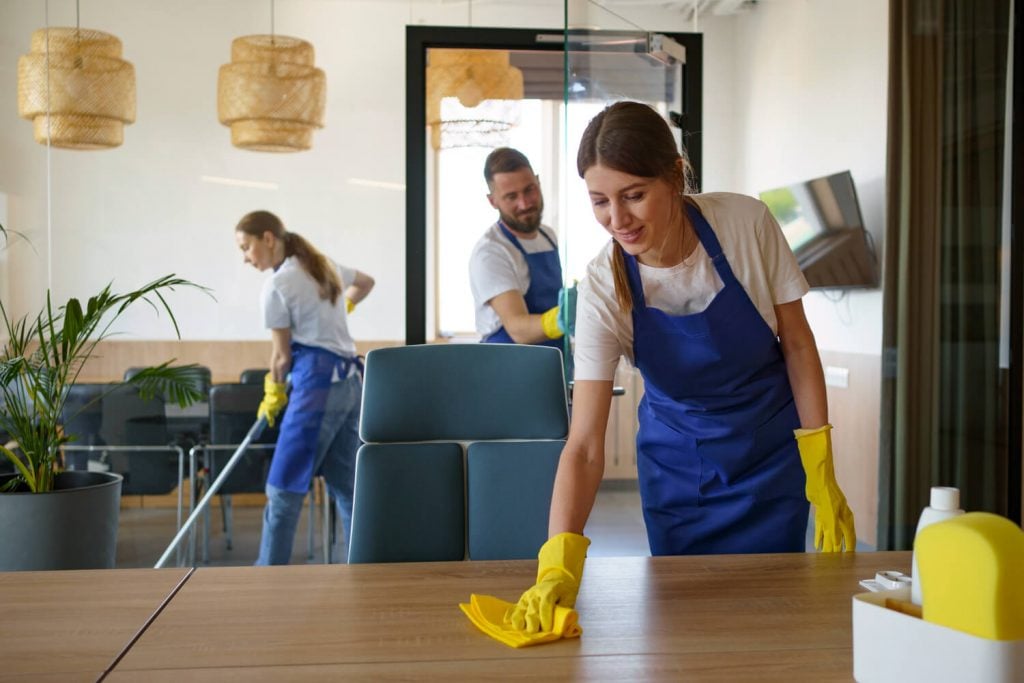
5. Define Your Pricing Strategy
Pricing is a key factor in determining whether you’ll make a profit or not. You need to ensure your booking rates cover all operating costs, generate profit, and remain competitive enough to attract more guests.
To develop a smart pricing strategy, consider the following:
- Understand Your Costs: Familiarize yourself with all operational costs, including cleaning fees, maintenance, and platform commissions. For more details, refer to our article How to Calculate and Save on Airbnb Costs.
- Market Demand: Adjust your pricing dynamically based on seasonal demand, local events, and the competitive landscape. For example, increase prices during peak seasons and offer discounts or promotions during off-peak times.
- Competitor Analysis: Pay attention to the pricing, services, and booking rankings of other hosts in your area. The goal isn’t necessarily to undercut competitors but to continually improve your property’s value.
- Psychology of Pricing: Consider pricing strategies that appeal to consumer psychology. For example, pricing your listing at $199 instead of $201 can often yield better results.
- Monitor and Adjust: Regularly evaluate your pricing strategy based on booking rates and guest feedback. Make necessary adjustments to optimize occupancy and maximize profits.
- Attracting Initial Guests: When starting on OTA platforms, your property may lack guest reviews, which can deter potential travelers. To overcome this, consider offering lower rates to attract initial bookings. Once you’ve built up positive reviews, you can gradually increase your pricing to match market demand.
For deeper insights, check out our article The Ultimate Guide to Smart Pricing for Short-Term Rentals. Following these tips for hosting with Airbnb help maximize your revenue.
6. Develop your Marketing Plan
A marketing plan is crucial for attracting guests and ensuring your property stands out among the competition. A well-crafted marketing strategy can help you draw more bookings and increase visibility.
- Create a Detailed and Attractive Listing: Highlight your property’s best features with high-quality photos, clear descriptions, and key amenities.
- List on Multiple Platforms: Expanding your presence on various rental platforms helps reach a wider audience and attracts different types of guests.
- Design Promotions at Different Times: Tailor promotional activities, such as discounts or special offers, to seasonal demand or key events.
- Promote via Social Media & Local Tourism Websites: Utilize social media channels and local travel websites to boost visibility and attract guests.
7. Listing on Airbnb
The process of listing property on Airbnb is relatively straightforward, following Airbnb’s guidelines.
And here are some additional Airbnb listing tips to help improve your visibility and attract more bookings.
- Title: Keep your Airbnb names short and emphasize key selling points, such as “Luxury Apartment in Downtown” or “Cozy Cabin Near the Beach.”
- Keywords: Include attractive keywords like “near attractions,” “unique,” “cozy,” and “family-friendly” in your description.
- Description: Highlight your property’s unique features, amenities, and the overall experience guests can expect. Avoid using complex industry jargon.
- Photos: If your budget allows, hire a professional photographer to capture high-quality, visually appealing images. Include detailed shots of bed linens, décor, and key amenities.
- Pricing: Consider offering discounts or special offers to attract your first set of guests quickly.
- House Rules: Clearly outline your expectations on noise levels, pets, and smoking to avoid any confusion for guests.
- Feedback & Optimization: Before publishing, have friends or family review your listing and provide feedback to make necessary improvements.
- Profile Picture: Upload a clear, friendly profile photo along with a short bio to help guests feel connected and build trust.
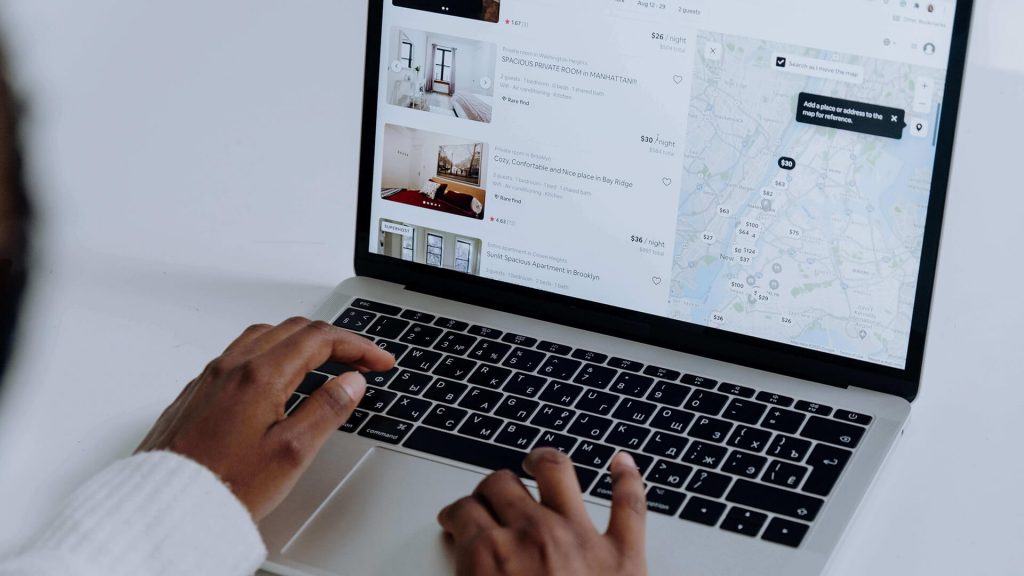
5 Beginner Tips for Hosting with Airbnb
By now, you’re ready to dive into hosting with Airbnb.
However, mastering how to host on Airbnb involves more than just listing your space. Effective hosting strategies can not only boost occupancy rates but also enhance guest satisfaction and loyalty.
Let’s share some practical hosting tips that will help you become a top-notch Airbnb host.
1. Listing on Multiple OTA Platforms
Although Airbnb is a popular platform, many travelers use other websites to search for accommodations. Relying solely on one platform could result in missed opportunities from potential guests.
By listing your property on multiple platforms, you can attract a wider variety of customers, significantly increasing visibility and booking chances.
- Booking.com: As one of the largest online booking platforms, Booking.com draws both business and leisure travelers. Its user-friendly interface supports multiple languages and currencies, making it ideal for international guests.
- Expedia: Expedia integrates hotel, flight, and rental car services, catering to travelers looking for comprehensive trip planning. Listing on Expedia helps reach a broader audience with varied travel needs.
- Vrbo: Vrbo specializes in family and group travel, making it a great fit for guests seeking entire homes or villas. It’s ideal for longer stays, family reunions, or group vacations.
- Google Vacation Rental: Google boasts the largest global user base, and travelers often search Google to plan their trips. Importantly, Google doesn’t charge any commission to hosts, making it cost-effective.
While you cannot directly create an account and list your property on Google Vacation Rental, you can partner with Google-authorized providers, like Hostex, to publish your property directly to Google.
2. Ensure Calendar Updates
For hosts listing properties on multiple OTA platforms, keeping your property calendar up to date is crucial.
You definitely don’t want issues like overbooking or double bookings, as these can lead to guest dissatisfaction, damage your reputation, affect future bookings, and even result in platform penalties.
Consider using a Property Management System (PMS). It can sync your property information and calendar automatically across multiple OTA platforms. These systems provide real-time updates. As a result, your property’s availability remains consistent across all platforms. This reduces errors caused by manual operations.

3. Timely Guest Communication
Smooth communication helps guests feel valued and respected, fostering trust and encouraging repeat stays and positive reviews.
- Responding to Inquiries: Guests often have questions before booking. Quick responses help them make decisions with confidence.
- Booking Confirmation: After a guest confirms their booking, send a thank-you email that confirms their reservation details and provides check-in instructions. This helps build trust and reduces any concerns.
- Before Check-In: A few days prior to check-in, send a message reminding guests about their upcoming stay and providing key details like key pickup, parking, and nearby amenities. Proactive communication enhances the guest experience.
- After Check-In: On the first day of their stay, send a friendly message checking in to ensure everything is going smoothly. This shows your care and helps address any potential issues promptly.
You can automate guest communications with Hostex’s automated messaging features. It will take care of your guests, even while you’re asleep.
4. High Standard Cleaning and Maintenance
A clean environment is a basic expectation for guests when staying in accommodations. The level of cleanliness upon check-in directly impacts their overall experience.
- Set Cleaning Standards: Establish clear cleaning standards and checklists to ensure consistent quality with each cleaning. This improves guest satisfaction and enhances the efficiency of your cleaning staff.
- Real-Time Notifications: Use automated systems to set real-time notifications, reminding cleaners to perform post-checkout cleaning promptly. This ensures no task is overlooked.
- Regular Inspections and Maintenance: Develop a routine maintenance plan to ensure all facilities and equipment are functioning properly. Regularly check air conditioning systems, water heaters, kitchen appliances, and other key components to keep them in optimal condition.
- Prompt Issue Resolution: Ensure quick response to any maintenance requests during guest stays. Establish clear communication channels so guests can report issues easily.
- Maintain Maintenance Records: Keep detailed maintenance records, including dates of repairs, issue descriptions, and solutions. This helps identify patterns of potential problems and develop more effective maintenance strategies.
5. Encouraging Positive Reviews
Guest reviews are essential for boosting your property’s visibility and attracting potential travelers. Positive reviews not only enhance your reputation but also improve your rankings on the platform.
Additionally, satisfied guests are more likely to become repeat customers and refer your property to friends and family.
Here are some strategies to effectively encourage positive Airbnb reviews:
- Gift at Check-Out: At check-out, offer a small gift, such as local souvenirs, mementos, or thank-you cards. These thoughtful gestures make guests feel appreciated, increasing their likelihood of leaving positive feedback.
- Exclusive Discounts: Provide returning guests with exclusive discounts as an incentive for booking again. This not only encourages repeat bookings but also motivates guests to share their positive experiences.
- Genuine Review Requests: Shortly after check-out, send a thank-you message, kindly requesting a review. Let guests know their feedback is valuable and helps improve your property’s offerings.
We’ve also written a detailed article on How to Get More 5-star Reviews on Airbnb.

Hosting with Airbnb: FAQs for New Hosts
By now, you’ve likely grasped many of the key steps involved in starting with Airbnb.
Below are some common questions along with their answers to help you better understand Airbnb operations and key factors for success.
1. How to become an Airbnb host?
Becoming an Airbnb host is relatively simple:
- Register and log into the Airbnb website, then click the “Airbnb your home” button at the top right.
- Complete the Airbnb identity verification process, which typically involves submitting government-issued identification (such as a passport or ID card) and other personal information.
- In some cases, Airbnb may perform credit checks to ensure reliability.
2. How much can I earn by hosting with Airbnb?
Earnings from Airbnb vary widely depending on location, property type, occupancy rate, and pricing strategy. Unfortunately, I can’t provide a precise number.
According to Airbnb’s official data, the average host globally earns about $9,600 per year.
However, this figure varies based on geography, property type, and occupancy rates.
For instance, according to AirDNA, many hosts in high-demand cities can achieve occupancy rates of 70%-90% with nightly rates averaging $200 or more, while smaller cities may have nightly rates of $$75$$150.
3. What if I don’t own a property? How can I make money on Airbnb?
We’ve covered this topic in detail before in our article, “How to Earn Money on Airbnb Without Owning Property.”
In short:
- Rental arbitrage: Lease property and sublet it on Airbnb, ensuring you have the landlord’s permission.
- Management services: Offer property management services to other hosts, taking a commission for managing their properties.
- Experience activities: If you have specific skills (e.g., cooking, guiding tours), offer experience activities like cooking classes or tours on Airbnb for additional income.
4. What kind of support does Airbnb offer for new listings?
In addition to acquiring essential hosting with Airbnb skills, platform support can be extremely helpful in the early stages.
Airbnb provides various forms of support for new listings, including:
- New Host Guide: Resources and training designed to help new hosts manage their listings effectively.
- Promotion opportunities: Airbnb may offer extra exposure for new listings to attract the first set of guests.
- Customer support: 24/7 assistance to help with any issues you may encounter during your operation.

5. How can I improve my Airbnb ranking quickly?
As we’ve mentioned earlier, when you first start with Airbnb, your ranking may be lower due to a lack of bookings and reviews.
The following strategies for hosting with Airbnb will help boost the Airbnb ranking:
- Optimize your listing description: Use relevant keywords and create an attractive title and description to improve search visibility.
- High-quality photos: Upload professional, high-quality photos that showcase your property’s best features, helping you stand out from competitors.
- Maintain high ratings: Provide excellent guest service to ensure positive reviews, which are crucial for improving your ranking.
- Keep your listing updated: Regularly update your availability, pricing, and property information to reflect market changes.
6. How do I become a Superhost?
The Superhost status is awarded by Airbnb to hosts who consistently deliver exceptional service. Achieving this status demonstrates that guests can expect a comfortable and seamless experience at your property.
To become a Superhost, you need:
- High ratings: Maintain an average guest rating of 4.8 stars or higher.
- Fast response times: Aim to respond to guest inquiries and booking requests within 24 hours.
- Exceptional service: Ensure your property is clean and well-equipped, and that you maintain good communication with guests before, during, and after their stay.
7. How do I get the Guest Favorite badge?
The Guest Favorite badge highlights listings loved by guests based on their feedback. Listings with this badge tend to rank higher in search results.
To qualify for the Guest Favorite badge, your property must meet the following criteria:
- At least 5 reviews from guests.
- Average rating of 4.9 stars or higher.
- Cancellation rate of less than 1%.
- No recent quality-related complaints from guests.
As a beginner in Airbnb hosting, it’s important to practice the tasks mentioned above, adjust your workflow based on experience, and explore more advanced techniques.
Using Airbnb automation tools like Hostex is highly recommended. These tools can help automate over 70% of repetitive tasks, allowing you to focus on more meaningful activities with your time.
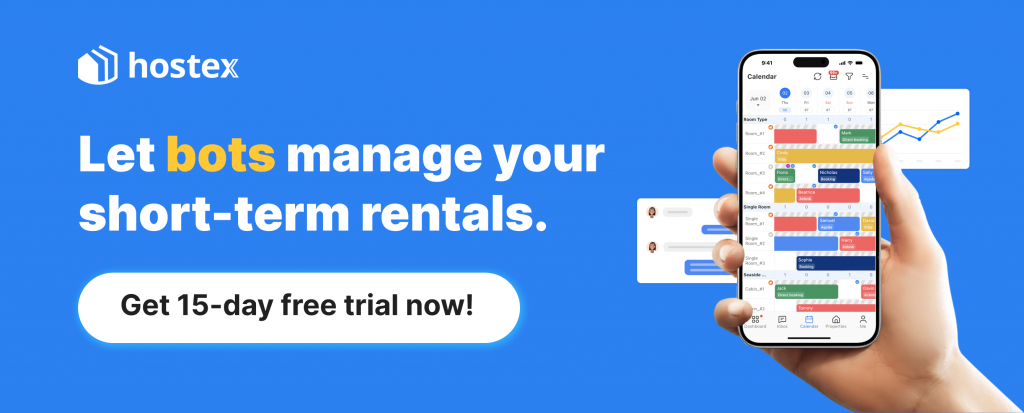


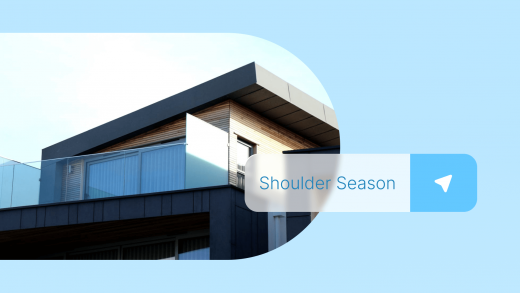
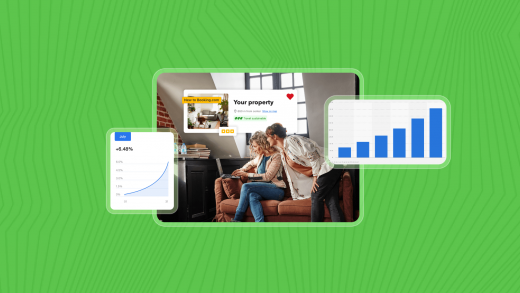
Thanks for sharing!
This resonates with me.
Well written!
Nice onw
Very useful information specifically the final phase 🙂 I maintain such information much.
Great post.
Nice post.
love your blog.
Cheers
What’s up to all, the contents present at this web page are genuinely awesome for people
knowledge, well, keep up the nice work fellows.
Спасибо большое за информацию 🙏❤️🙂🤗